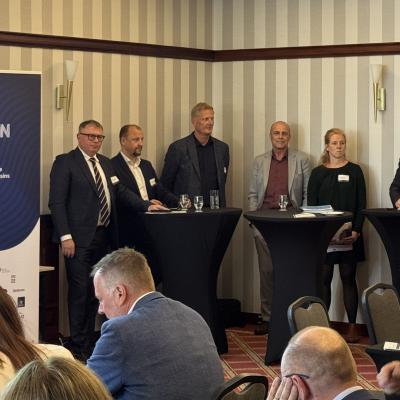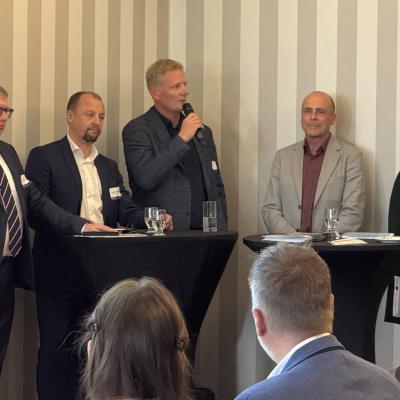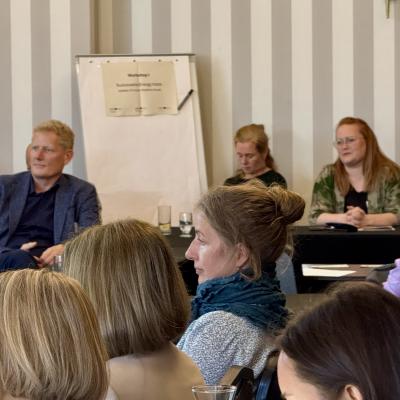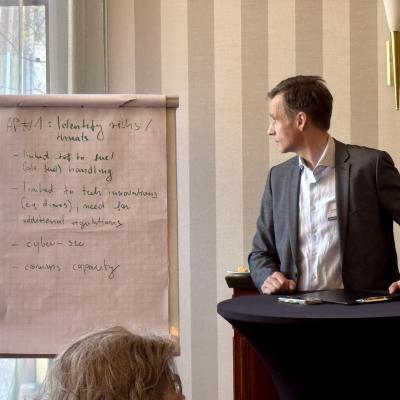On April 28-29, a joint event focusing on the blue economy, encompassing Poland, eastern Germany, Denmark, and south-eastern Sweden, was held at the 4th Mission Arena BANOS.
The event aimed to foster discussions and co-create a roadmap to guide the region towards achieving the goals of the EU Mission Oceans & Waters, which seeks to restore oceans and waters and promote a carbon-neutral and circular blue economy. The highlight of the event was the session titled "Ports – Sustainable & Secure Energy Hubs in an Evolving Transport Landscape," organized by the Blue Supply Chains Project partners, in collaboration with the REDII Ports Project and H2Derivatives@BalticSeaPorts Project. This session underscored the evolving role of ports as sustainable energy hubs, their transition towards zero emissions, and their continued importance as traditional freight hubs.
The discussion opened with an acknowledgment of the challenging landscape faced by ports, driven by both business and geopolitical factors. Ports are at the forefront of decarbonization efforts, with increasing pressure to integrate renewable energy sources and adapt to regulatory frameworks. While these efforts bring opportunities, such as the potential for green hydrogen and other alternative fuels, significant barriers exist, particularly related to infrastructure development, regulatory support, and financing.
Linda Styhre from the Swedish Environmental Institute emphasized that ports are exploring multiple fuel options, including biofuels like biogas and electrofuels such as hydrogen. She highlighted the need for better safety measures around new technologies and pointed out the significant cost gap between fossil fuels and biofuels, noting the lack of urgency in addressing the transition to sustainable fuels. Manfred Lebmeier from the Hamburg Port Authority focused on the need for electric power in ports, stressing local production and storage. However, he noted challenges with transporting hydrogen and CO2, underscoring the need for further regulation and clarity around logistics responsibilities.
Jan Jarmakowski from Gdynia Container Terminal provided a port operator’s viewpoint, stressing that decarbonization measures would ultimately affect end consumers in terms of cost allocation. He highlighted the importance of cooperation between port authorities, energy grid operators, and port operators to support the transition. Jan pointed out that the increase in energy consumption, alongside regulatory hurdles, requires a concerted effort to ensure energy efficiency and support for carbon-free operations. Henning Dierks from Mabanaft shared optimism about projects underway in Germany, including hydrogen production and the conversion of diesel infrastructure to support methanol.
Wojciech Muchlado from P&O Ferrymasters discussed the critical need for stakeholder collaboration between port operators, customers, and energy providers. He underscored the urgency of securing funding and developing solutions that align with decarbonization goals. However, he also noted that only a small percentage of customers are willing to invest in sustainable solutions, which needs to change. The discussion emphasized that sustainable investments are essential but require substantial financial commitments, with a need for clear stakeholders to take responsibility.
The discussion also touched upon ports’ traditional role in handling goods and how that role might evolve with the increasing focus on sustainability. Linda Styhre underscored the importance of resilient transport systems and the balancing act between energy transition and maintaining the ports’ core functions. Manfred Lebmeier added that while the push for sustainability is essential, ports are businesses that must remain financially viable.
The session highlighted several regulatory issues, including the need for energy production to be as close as possible to the ports and for clearer regulations around emissions, fuel supply, and waste management. These regulatory barriers are often compounded by the need to align with local and global frameworks.
Following the discussion panel, three parallel round table workshops were held, led by Linda Styhre & Elin Malmgren (IVL – Swedish Environmental Institute), Gunnar Platz (PLANCO Consulting), and Maciej Brzozowski (Port of Hamburg Marketing). These workshops involved 70 participants who discussed the current and future roles of ports in the European transport system. The discussions highlighted the increasing complexity and range of tasks for ports, emphasizing their strategic importance for Europe's supply chain sovereignty and energy transition.
The session concluded with a recognition of the urgency required to transform ports into sustainable energy hubs. Participants emphasized the importance of collaboration, adequate funding, and regulatory clarity to overcome the challenges associated with the energy transition. Ports must continue to evolve, ensuring that sustainability goals align with their business needs while maintaining resilience in their traditional roles. The session reinforced the view that while the challenges are significant, the opportunities for ports to become sustainable energy hubs are substantial, provided that stakeholders work together to address infrastructure, regulatory, and financial issues.



